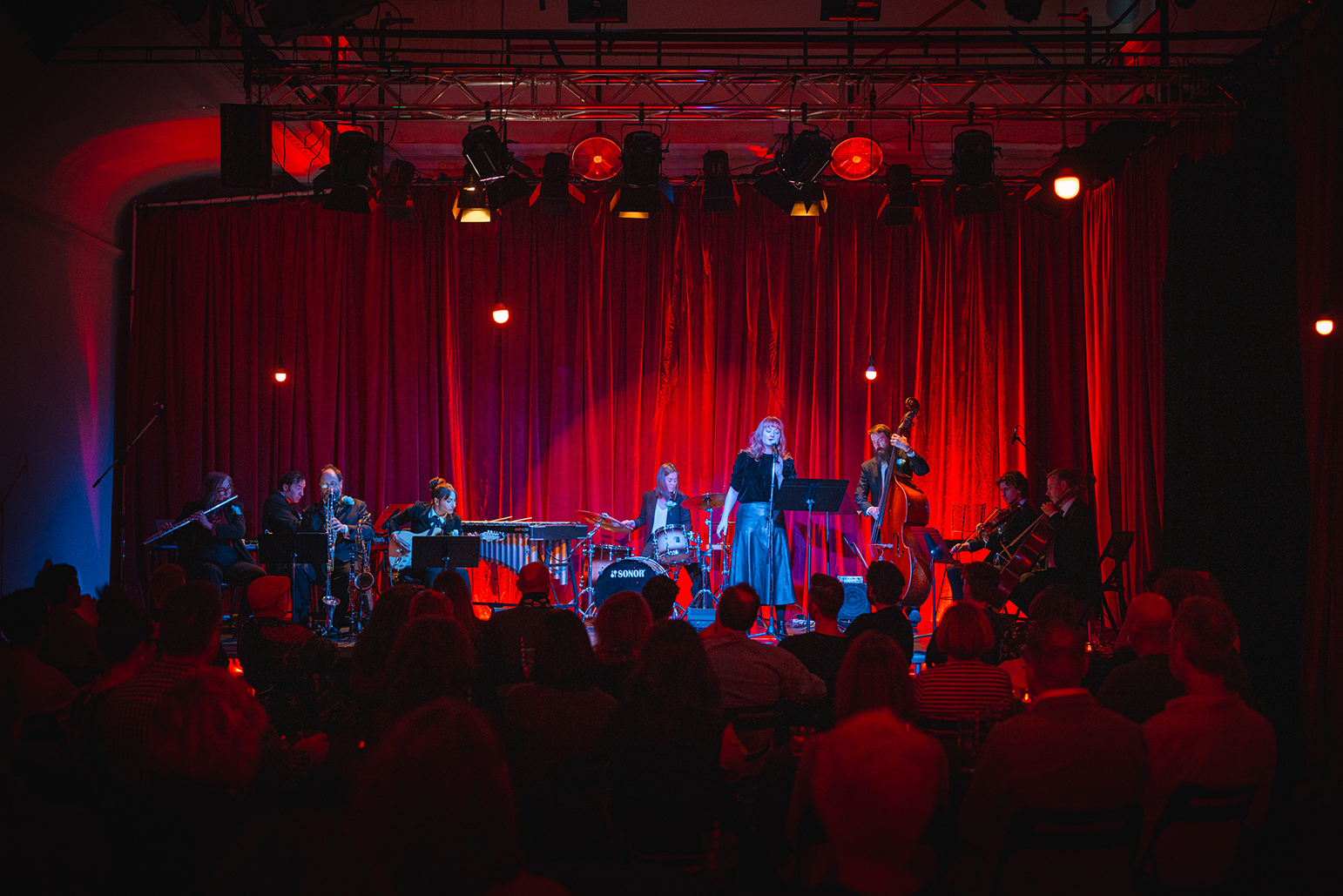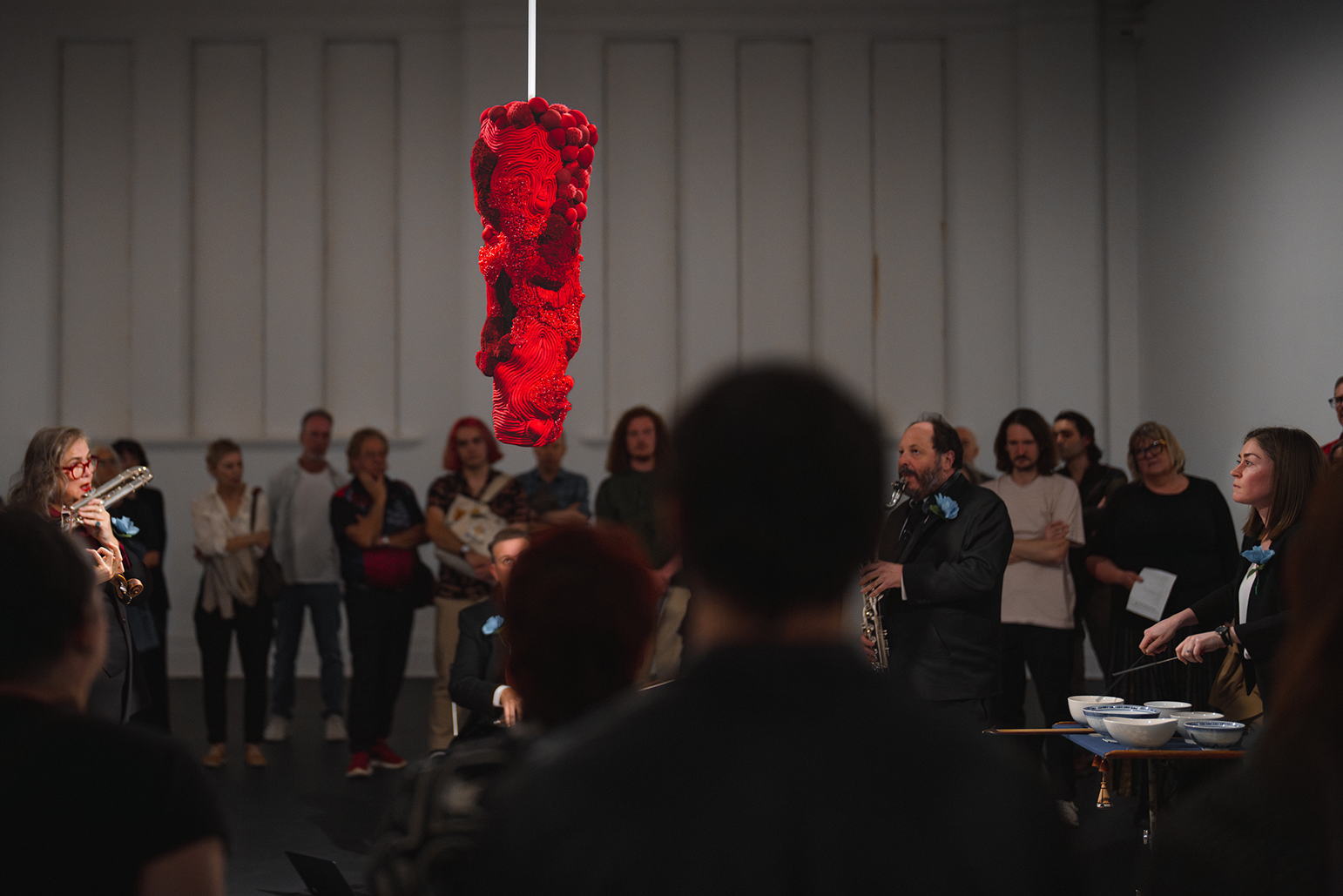

Unconventionally for a critic, I witnessed the final (rather than first) performance of Decibel New Music’s three-night Twin Peaks Was 30 rendition of Angelo Badalamenti compositions at the Perth Institute of Contemporary Arts (PICA). All three nights were sold out. I entered with high expectations. Last year, I attended Decibel New Music’s performance Drawing Sound in Space at the Rechabite Hall: an experimentation with alternate music notations that utilised a bespoke iPad notation application, along with visuals by Sohan Ariel Hayes to induce feelings of awe and excitement at the future possibilities of art and music’s entanglements. I have seen and heard many attempts to bridge the gap between academic, formalistic, and classical music, and more adventurous, experimental, contemporary (electronic) compositions to varying degrees of success. To my surprise, here in Perth, Decibel conjured a world-class, classically trained ensemble doing just that, and doing it well.
With Decibel revisiting the haunting sounds of Twin Peaks at the request of Tura New Music, something else had me occupied. My thoughts lingered less on the music, set alight by inventiveness and exploratory intent, and instead on the ensemble as musicians, artists, and professionals—and more specifically, how their practice related to an audience of non-musician concertgoers. How did they find themselves performing the score of an American TV show and subsequent film? Was this a push forward into the unknown, a chance to explore the concept of New Music? Or was the night an attempt to gather an unsuspecting audience—perhaps unused to such provocations—and have them to sit and ponder the world of experimental music, with the offer of a few arranged covers and medleys (that came at the end of the night) to coax them there? With this in mind, I was wondered whether it was the task of Decibel to entertain or challenge its audience?
For the uninitiated, Mark Frost and David Lynch's critically acclaimed serial drama Twin Peaks originally aired in the early 90s and follows the investigation into the murder of small-town homecoming queen Laura Palmer. The series achieved cult-classic status, beloved for its many twists and turns, dream-like qualities, and original score. Twin Peaks elevated the TV series to an artform whose legacy has been long-lasting. Angelo Badalamenti’s soundtrack seeped into cultural consciousness. Its haunting melodies and atmospheric themes transfixed audiences and found its way into the songs of pop and alternative artists of the time. It bridged the worlds of dark ambient, drone and noir jazz, in an accessible package. Decibel’s Cat Hope has stated that it, and specifically the works of Lynch & Badalamenti in the project Thought Gang, are strong influences on her work.
Decibel’s PICA performance was specifically in celebration of the 30th anniversary of David Lynch’s film Twin Peaks: Fire Walk With Me (1992), a prequel to the series, that has been reappraised as one of Lynch’s masterpieces. Perhaps, even more specifically, the night was in memory of Angelo Badalamenti and Julee Cruise, long time musical collaborators of Lynch across films and theatre productions.
The evening began with audience members entering through PICA's newly furbished side entrance, awaiting further instruction in the lobby. Ushers, donned white masks with elongated noses, welcomed guests before leading the procession through the venue's rear passageways and into PICA’s main hall where we were to be seated. The first piece was performed with the players behind a large plastic sheet, a reference hopefully not lost on even the most casual Twin Peaks. For the piece, Since I was 12, Rachel Dease’s original vocals were routed separately, played through speaker systems in the rafters above the audience. This was a novel attempt to explore the natural reverbs of PICA’s main hall, and resulted in a haunting, spectral echo. Across four distinct performances by Decibel’s ensemble, we were ushered around the interior of PICA, climbing stairs and walking through hallways to experience each iteration. James Rushford’s original composition Espalier was performed on the PICA balcony; a reference to its original commission as part of Decibel New Music’s singular Was event in 2012. As part of a retrospective of the Australian experimental musician Jon Rose, Rushford’s piece was also inspired by Twin Peaks back then, and is perhaps one of the clues as to the relevance of this night to PICA and Perth audiences at large, a dozen years later.
The composition most compelling to me was Glacé Cocoon by WA composer Rebecca Erin. Performed in the West End gallery space, it featured four musicians sitting around a dangling, sculpture that rotated slowly. The musicians played in reaction to the architectural bumps and turns of the suspended form, an “assemblage of manipulated textiles, plastics, and found objects”. The non-standard notation and unconventional staging seemed to be Decibel's way of injecting some contemporary experimental flair into this retrospective endeavour.
The night concluded with its intended climax: returning down PICA’s staircase after Erin’s composition, we found the main hall seating cleared out and replaced with a faux-bar scene, an ode to the Pink Room in Fire Walk with Me. We collected our Twin Peaks themed cocktails and watched the band perform a series of Badalamenti and Lynch works: Falling and Laura’s Theme, The Pink Room, Questions in a World of Blue and Fire Walk with Me. These pieces—arranged in collaboration between guitarist Candice Susnjar and Decibel—were performed competently, as one would expect by the pedigree on stage. Regardless, they left me feeling as if I had watched talented musicians make a pragmatic choice to appeal to a broad audience. In this piece, there was nothing unexpected: no edgy tinge, no textural adventure. Instead, what emerged were all-too-straight recital of covers.
While Jenny Hector's intensive design and lighting was admirable, the lingering impression was one of a curatorial team stuck in a nostalgic mood. The Badalamenti/Lynch arrangements felt shoehorned into surroundings usually reserved for far more artistic intentions, and served as a reminder of the undeniable talents of Decibel, deserving of a fresher artistic vision. The newly commissioned works provided some respite, with Matt Warren's The Tulpas Meet skillfully blending light and dark tones while nodding to Badalamenti's jazz-tinged scores. Rachael Dease's Since I Was 12 effectively conjured the cyclical dread lurking in the narrative of Laura Palmer's life. However, these seemed like foot-notes to the main affair; appetisers and mood-setters. These contemporary pieces couldn't quite shake the overwhelming feeling of being trapped in the Black Lodge of Twin Peaks lore—unable to escape an overbearing sense of commercial indulgence.
I remain confused as to the rationale of this Twin Peaks tribute overall. Both Decibel and Tura New Music do important work, of which I am an ardent fan. I must acknowledge the positives of seeing the Ensemble perhaps reach new audiences, but I can’t shake my feelings of being let-down by the night.
In writing this review and finding the original performance of Espalier, I couldn’t help compare the prior intent of that performance—a night dedicated to the works of the Australian stalwart Jon Rose, who I was disappointingly unfamiliar with—to one dedicated to perhaps the most famous of American arthouse directors and his (also very famous) collaborators. A cursory google can find hundreds of eulogies to these American artists, in almost all major publications. Are there any other Australian musicians deserving of a night like this?
David Lynch warped the idea of a quaint town to reveal the decay and horror underneath. For Twin Peaks Was 30, Decibel New Music seemed to reverse that—taking the subversive concept and repackaging it as a trip down memory lane, as if in a museum, in the setting of a contemporary art gallery. One wonders if the ensemble's innovative talents wouldn't be better served taking the art of new music to radically new dimensions, as they have successfully done before. But maybe this can be forgiven—maybe it was all just a bit of fun!
Twin Peaks Was 30 by Decibel New Music Ensemble, 9–11 May 2024, Perth Institute of Contemporary Arts.
Image credits: Decibel New Music, Twin Peaks Was 30, at Perth Institute of Contemporary Arts, photo by Edify Media.
With Decibel revisiting the haunting sounds of Twin Peaks at the request of Tura New Music, something else had me occupied. My thoughts lingered less on the music, set alight by inventiveness and exploratory intent, and instead on the ensemble as musicians, artists, and professionals—and more specifically, how their practice related to an audience of non-musician concertgoers. How did they find themselves performing the score of an American TV show and subsequent film? Was this a push forward into the unknown, a chance to explore the concept of New Music? Or was the night an attempt to gather an unsuspecting audience—perhaps unused to such provocations—and have them to sit and ponder the world of experimental music, with the offer of a few arranged covers and medleys (that came at the end of the night) to coax them there? With this in mind, I was wondered whether it was the task of Decibel to entertain or challenge its audience?
For the uninitiated, Mark Frost and David Lynch's critically acclaimed serial drama Twin Peaks originally aired in the early 90s and follows the investigation into the murder of small-town homecoming queen Laura Palmer. The series achieved cult-classic status, beloved for its many twists and turns, dream-like qualities, and original score. Twin Peaks elevated the TV series to an artform whose legacy has been long-lasting. Angelo Badalamenti’s soundtrack seeped into cultural consciousness. Its haunting melodies and atmospheric themes transfixed audiences and found its way into the songs of pop and alternative artists of the time. It bridged the worlds of dark ambient, drone and noir jazz, in an accessible package. Decibel’s Cat Hope has stated that it, and specifically the works of Lynch & Badalamenti in the project Thought Gang, are strong influences on her work.
Decibel’s PICA performance was specifically in celebration of the 30th anniversary of David Lynch’s film Twin Peaks: Fire Walk With Me (1992), a prequel to the series, that has been reappraised as one of Lynch’s masterpieces. Perhaps, even more specifically, the night was in memory of Angelo Badalamenti and Julee Cruise, long time musical collaborators of Lynch across films and theatre productions.
The evening began with audience members entering through PICA's newly furbished side entrance, awaiting further instruction in the lobby. Ushers, donned white masks with elongated noses, welcomed guests before leading the procession through the venue's rear passageways and into PICA’s main hall where we were to be seated. The first piece was performed with the players behind a large plastic sheet, a reference hopefully not lost on even the most casual Twin Peaks. For the piece, Since I was 12, Rachel Dease’s original vocals were routed separately, played through speaker systems in the rafters above the audience. This was a novel attempt to explore the natural reverbs of PICA’s main hall, and resulted in a haunting, spectral echo. Across four distinct performances by Decibel’s ensemble, we were ushered around the interior of PICA, climbing stairs and walking through hallways to experience each iteration. James Rushford’s original composition Espalier was performed on the PICA balcony; a reference to its original commission as part of Decibel New Music’s singular Was event in 2012. As part of a retrospective of the Australian experimental musician Jon Rose, Rushford’s piece was also inspired by Twin Peaks back then, and is perhaps one of the clues as to the relevance of this night to PICA and Perth audiences at large, a dozen years later.
The composition most compelling to me was Glacé Cocoon by WA composer Rebecca Erin. Performed in the West End gallery space, it featured four musicians sitting around a dangling, sculpture that rotated slowly. The musicians played in reaction to the architectural bumps and turns of the suspended form, an “assemblage of manipulated textiles, plastics, and found objects”. The non-standard notation and unconventional staging seemed to be Decibel's way of injecting some contemporary experimental flair into this retrospective endeavour.
The night concluded with its intended climax: returning down PICA’s staircase after Erin’s composition, we found the main hall seating cleared out and replaced with a faux-bar scene, an ode to the Pink Room in Fire Walk with Me. We collected our Twin Peaks themed cocktails and watched the band perform a series of Badalamenti and Lynch works: Falling and Laura’s Theme, The Pink Room, Questions in a World of Blue and Fire Walk with Me. These pieces—arranged in collaboration between guitarist Candice Susnjar and Decibel—were performed competently, as one would expect by the pedigree on stage. Regardless, they left me feeling as if I had watched talented musicians make a pragmatic choice to appeal to a broad audience. In this piece, there was nothing unexpected: no edgy tinge, no textural adventure. Instead, what emerged were all-too-straight recital of covers.
While Jenny Hector's intensive design and lighting was admirable, the lingering impression was one of a curatorial team stuck in a nostalgic mood. The Badalamenti/Lynch arrangements felt shoehorned into surroundings usually reserved for far more artistic intentions, and served as a reminder of the undeniable talents of Decibel, deserving of a fresher artistic vision. The newly commissioned works provided some respite, with Matt Warren's The Tulpas Meet skillfully blending light and dark tones while nodding to Badalamenti's jazz-tinged scores. Rachael Dease's Since I Was 12 effectively conjured the cyclical dread lurking in the narrative of Laura Palmer's life. However, these seemed like foot-notes to the main affair; appetisers and mood-setters. These contemporary pieces couldn't quite shake the overwhelming feeling of being trapped in the Black Lodge of Twin Peaks lore—unable to escape an overbearing sense of commercial indulgence.
I remain confused as to the rationale of this Twin Peaks tribute overall. Both Decibel and Tura New Music do important work, of which I am an ardent fan. I must acknowledge the positives of seeing the Ensemble perhaps reach new audiences, but I can’t shake my feelings of being let-down by the night.
In writing this review and finding the original performance of Espalier, I couldn’t help compare the prior intent of that performance—a night dedicated to the works of the Australian stalwart Jon Rose, who I was disappointingly unfamiliar with—to one dedicated to perhaps the most famous of American arthouse directors and his (also very famous) collaborators. A cursory google can find hundreds of eulogies to these American artists, in almost all major publications. Are there any other Australian musicians deserving of a night like this?
David Lynch warped the idea of a quaint town to reveal the decay and horror underneath. For Twin Peaks Was 30, Decibel New Music seemed to reverse that—taking the subversive concept and repackaging it as a trip down memory lane, as if in a museum, in the setting of a contemporary art gallery. One wonders if the ensemble's innovative talents wouldn't be better served taking the art of new music to radically new dimensions, as they have successfully done before. But maybe this can be forgiven—maybe it was all just a bit of fun!
Twin Peaks Was 30 by Decibel New Music Ensemble, 9–11 May 2024, Perth Institute of Contemporary Arts.
Image credits: Decibel New Music, Twin Peaks Was 30, at Perth Institute of Contemporary Arts, photo by Edify Media.
